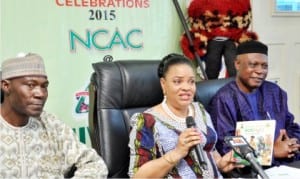Business
Mobil Pumps N160bn Into NDDC In 16 Years

Director, Finance and Accounts, National Council for Arts and Culture (NCAC), Mr Musa Baburia, Director General, Mrs Dayo Keshi and Director, Extension Services, Mr Hilary Ogbechie, at a news conference on NCAC’s 40th Anniversary in Abuja, yesterday.
Mobil Producing Nigeria (MPN), a subsidiary of ExxonMobil, says it has contributed N160 billion to the Niger Delta Development Commission (NDDC) since its inception in 2001.
The MPN Manager, Media and Communications, Mr Ogechukwu Udeagha, disclosed this in Uyo on Wednesday at a two-day capacity building workshop for newsmen in Akwa Ibom.
The workshop, which was sponsored by Mobil, has the theme: “Professionalism, media ethics and responsibility in sustaining democracy and deepening oil and gas operations reportage.”
Udeagha said that the company had contributed over N16 billion to infrastructure development in Akwa Ibom in the last three years.
He said that as a major player in the oil and gas sector, the company had sponsored annual athletics championships and science quiz for secondary schools in Akwa Ibom.
The manager said that the company also offered scholarships to undergraduate and post graduate students as well as sponsorship of Graduate Assistance Programme (GAP) for unemployed graduates.
Other programmes sponsored by the company included refresher training for primary and secondary school teachers and economic empowerment programme for women.
He announced that Mobil would assist the state council of the Nigeria Union of Journalists (NUJ) in building its mini-club house.
Udeagha appealed to the media to remain professional, ethical and socially responsible in the reportage of oil and gas business, given the global crash in oil price.
The chairman of the occasion, Prof. Udoudo Ekanemesang, said media practitioners were very powerful people that could make or mar the world.
Ekanemesang, who is the Vice Chancellor of Obong University, the first private university licensed in Akwa Ibom, urged the media to uphold the responsibility to educate the public seriously.
“The media is the guardian of public interest. The media invariably is expected to hold elected officials and political office holders accountable for their actions or in-actions.
“The press has another social responsibility of promoting human rights; everyone’s human rights, especially during periods of political uncertainty,” Ekanemesang said.
He advised the media practitioners to adhere strictly to the ethics of the profession by being fair, truthful, factual, and of high integrity in the reportage of events.
The Speaker of the state House of Assembly, Mr Aniekan Uko, urged journalists in the state to shun sensational reportage and outright falsehood.
Uko said that the house would always support ethical media practice in the state.
He called on the state council of NUJ to discipline erring journalists, especially those working for private local tabloids in the state.
The state Chairman, NUJ, Mr Patrick Albert, thanked ExxonMobil for sponsoring the workshop, describing the company as a responsible organisation.
He said that the council was delighted to have the workshop for its members to inculcate in them the need for ethical practice.
Albert promised that the union would disown any journalist that flouted the professional code of ethics.
Business
PENGASSAN Tasks Multinationals On Workers’ Salary Increase

Business
SEC Unveils Digital Regulatory Hub To Boost Oversight Across Financial Markets

Business
NAFDAC Decries Circulation Of Prohibited Food Items In markets …….Orders Vendors’ Immediate Cessation Of Dealings With Products

Importers, market traders, and supermarket operators have therefore, been directed to immediately cease all dealings in these items and to notify their supply chain partners to halt transactions involving prohibited products.
The agency emphasized that failure to comply will attract strict enforcement measures, including seizure and destruction of goods, suspension or revocation of operational licences, and prosecution under relevant laws.
The statement said “The National Agency for Food and Drug Administration and Control (NAFDAC) has raised an alarm over the growing incidence of smuggling, sale, and distribution of regulated food products such as pasta, noodles, sugar, and tomato paste currently found in markets across the country.
“These products are expressly listed on the Federal Government’s Customs Prohibition List and are not permitted for importation”.
NAFDAC also called on other government bodies, including the Nigeria Customs Service, Nigeria Immigration Service(NIS) Standards Organisation of Nigeria (SON), Nigerian Ports Authority (NPA), Nigerian Maritime Administration and Safety Agency (NIMASA), Nigeria Shippers Council, and the Nigeria Agricultural Quarantine Service (NAQS), to collaborate in enforcing the ban on these unsafe products.
-

 Politics4 days ago
Politics4 days agoWhy Reno Omokri Should Be Dropped From Ambassadorial List – Arabambi
-

 Politics3 days ago
Politics3 days agoPDP Vows Legal Action Against Rivers Lawmakers Over Defection
-

 Sports3 days ago
Sports3 days agoNigeria, Egypt friendly Hold Dec 16
-

 Sports3 days ago
Sports3 days agoNSC hails S’Eagles Captain Troost-Ekong
-

 Oil & Energy3 days ago
Oil & Energy3 days agoNCDMB Unveils $100m Equity Investment Scheme, Says Nigerian Content Hits 61% In 2025 ………As Board Plans Technology Challenge, Research and Development Fair In 2026
-

 Politics3 days ago
Politics3 days agoRIVERS PEOPLE REACT AS 17 PDP STATE LAWMAKERS MOVE TO APC
-

 Politics3 days ago
Politics3 days agoWithdraw Ambassadorial List, It Lacks Federal Character, Ndume Tells Tinubu
-

 Sports3 days ago
Sports3 days agoMakinde becomes Nigeria’s youngest Karate black belt

